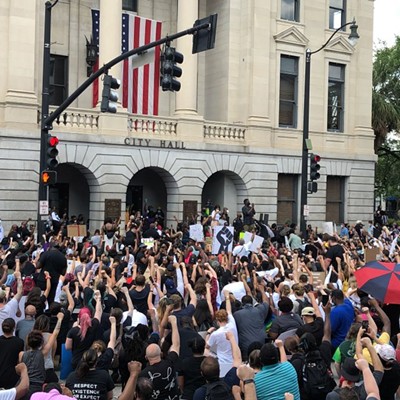Do we always have to make people go away?
— Bill Maher, on Paula Deen
It's been written many times that slavery is America's original sin. And much like Christianity's idea of original sin, ours seems redeemable only by enormous sacrifice, if at all.
We're often told how forgiving Americans are, how we more than any other people just love to give everyone a second chance.
This is true nearly all the time. Professional athletes, for example, routinely either do jail time or narrowly avoid it, and are celebrated when they return to the playing field. As long as they still play well, that is.
But when a racial transgression is involved, there seems to be no amount of time one can do to make it go away, no remedy to set things right. You have to go away.
The issue of race in 2013, even in an era of a successful, two-term African-American president, is still that charged.
Technically, slavery is the collective sin of many nations, the Bible itself being chock-a-block with it, just to name one example. But the United States is certainly unique in that we killed half a million of our own citizens in a war fought largely to retain slavery as an institution.
Take some time to read about the savagery of the Civil War battlefield. The injuries caused by artillery shells at nearly point-blank range. Entire trees cut down by the hail of bullets. The stark casualness of battlefield amputations, buckets filled with arms and legs. The bayonet charges at Gettysburg, cold steel in the belly. Dysentery, diarrhea, tuberculosis, trench foot.
Think about the passions that must have been stirred to compel men to endure such horror, and to mete it out.
Even the Europeans — who gleefully butchered each other for centuries over anything, or nothing — were slack-jawed with amazement at the level of violence here.
And for what? The causes are still debated in some quarters, but clearly one was slavery.
America, land of the perpetual second chance, was one of the last nations to relinquish slavery. Brazil — where 40 percent of the entire transatlantic slave trade disembarked — banned it in 1888, the last nation in the Western hemisphere to do so, just one generation after our Civil War.
Yup, America gave slavery lots of those second chances we're famous for. So yeah. The feelings are still pretty raw.
Back to Paula Deen: You want a teachable moment out of these things. And if the only teachable moment is that a nearly 70-year-old white woman from rural Georgia might have some less-than-enlightened ideas about race... we've missed the moment.
It's the journalistic equivalent of shooting fish in a barrel to opine that Deen said something wrong and she must pay the price. Of course it was wrong and of course there should be consequences in proportion to the wrongdoing, as with anyone else.
But if we stop there... it's too easy. It's going through the motions.
As Bill Maher insinuates, it becomes a ritual sacrifice instead of something we can all really learn from.
(For a very personal take on pervasive racism and its often insidious ways, see Jessica Leigh Lebos's column this issue.)
It's easy to make an example of Deen. She's made it easier by her bumbling way of addressing the scandal after her corporate handlers quickly deserted her. For contrast, see how excruciatingly long it takes Nike to terminate a controversial athlete's endorsement contract.
But if you want to dwell on the semantics of the N-word, fine. Let's dwell.
(However, speaking of inflammatory words, I strongly suggest we not follow the word choice of a Savannah Morning News columnist who recently wrote that Deen had been "lynched," figuratively speaking. No. No, she hasn't been lynched in any sense of the word. Just. Stop.)
As a Southern white male, I've been on the receiving end of opinions which might make your hair curl, the speakers simply assuming ahead of time that I'd be OK with whatever heinous thing they were saying.
Then again — unlike Deen in her deposition — I can't remember the last time I heard a white person use the N-word. Not that I haven't heard it, but it's been so long I couldn't tell you when it was or who said it.
But I can certainly remember the last time I heard the N-word said by someone who isn't white. And the time before that. And the time before that.
So while we're talking about uncomfortable things, maybe we should also talk about that, and what it might tell us, eh?
That said, and echoing many of Jessica's sentiments, I prefer to focus on what the Deen story is really about: The intersection of race and money. That's the real taboo.
So you want to talk about race? Let's talk.
Let's talk about widening economic disparity and its impact on minority communities in an era when unemployment benefits are constantly being slashed.
Let's talk about the dire scarcity of African-American managers in companies like the Deen empire, and all over the U.S.
Let's talk about how food stamp programs incentivize people to eat the kind of non-nutritious processed crap that has the highest profit margin for the big corporations that sell said processed crap.
Let's talk about how the least-healthy crops for American farmers to grow are the crops most subsidized by the government.
Let's talk about food deserts in poor, mostly minority neighborhoods, where nary a piece of fruit or a leaf of vegetable can be found, but there's a convenience store on every corner.
Let's talk about the link between proper nutrition — of the type certainly not in evidence in Deen's cookbooks and shows — and a child's physical and mental well-being.
These are the conversations we should be having. Let's leave discussions of the pariah N-word to academia, and really get down to business, shall we?






























